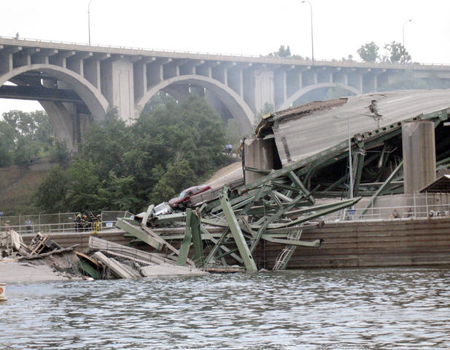I’m an engineer by trade, and while I don’t do much “engineering” anymore, I still think like one. One apt lesson for entrepreneurs is to plan their business with the care and rigour of an engineer.
The number one priority for an engineer is to protect public safety. It is the reason why engineers are licensed. The iron ring that engineers in Canada wear is a symbol of the oath to protect public safety above all other considerations. It’s easy to see why. Mistakes in engineering cause catastrophes like collapsed bridges, crashed airplanes and factory explosions.

To avoid these disasters, engineers use safety factors. When specifying a material for a structure, an engineer will use a factor that will provide three to four times as much strength as is required by design calculations. Bridges, levees and other water structures are designed to withstand beyond one-in-100 year flood levels. This is due to the high danger of failure compared to relatively low cost of increased safety. In addition, engineers know that real life will never be the same as the drafting table (for those younger readers, that’s what engineers used before computers). Flaws in materials, workmanship, and design as well as changes in usage and wear and tear all eat away at these safety factors. Finally, regardless of the skill of the engineer and tradesperson, things will happen that nobody anticipates.
This isn’t to say that planes don’t crash and factories don’t blow up. It’s impossible to eliminate risk totally. Even if you could, your project would become so expensive it wouldn’t be feasible. The best engineers balance risk and cost. They provide the safety required while not destroying the budget.
So what does this mean to an entrepreneur? A failed business doesn’t kill people or do widespread environmental damage. It can, however, destroy personal wealth for the entrepreneur, investors and employees. Much of the risk in business failure can be dealt with in the planning stage. For instance:
- In the design phase, the engineer will rely on measurements in the field. This is like basing the sales and marketing assumptions on research. Yes, it’s possible to start a business on a hunch, but the success is due more to fortune than skill.
- An engineer will sometimes specify a material with properties that exceed requirements. This is because of things like fatigue and corrosion. An entrepreneur does this by building a management team with skills beyond what appears to be immediately necessary.
- The engineering safety factor is like the amount of cash the entrepreneur has to invest in the business. Our plans come with a standard level of three months cash on hand at all times. This means that there is enough cash retained to cover payroll and all fixed costs for three months.
- When an engineer discovers a flaw in the design, it’s back to the drawing board. Nobody dies or gets hurt. When an entrepreneur finds a flaw in her plan, she can rework it to get it right. Nobody goes broke.
In summary, using the engineering method will not guarantee success in business. No plan can totally eliminate risk. However, using these methods will help you build your business to be strong and durable enough to protect your time and investment.
